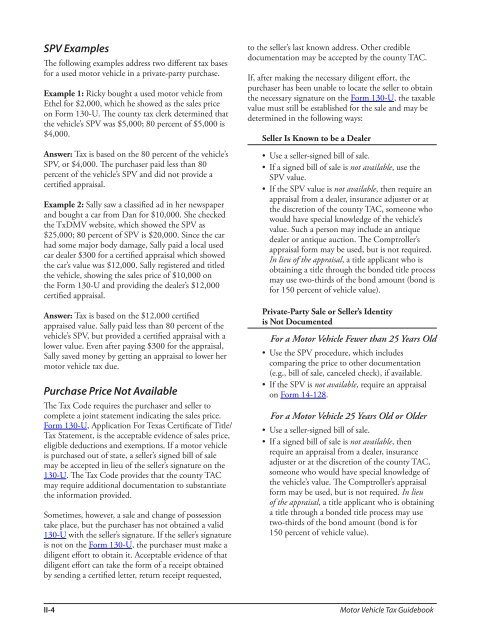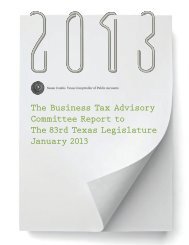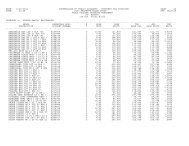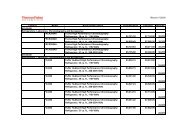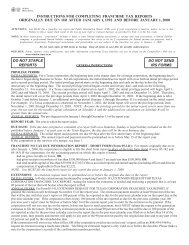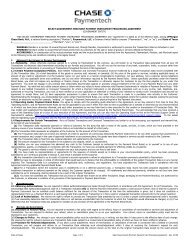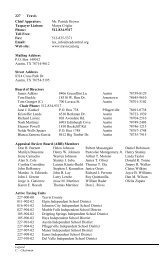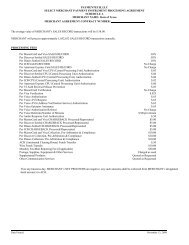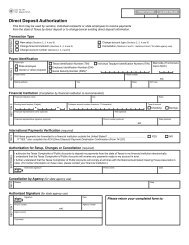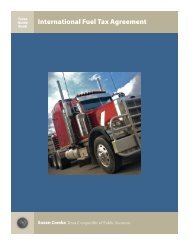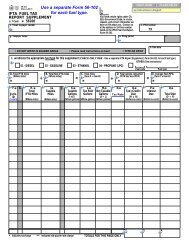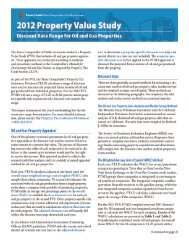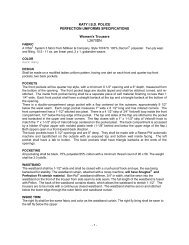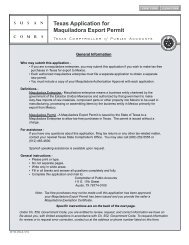Motor Vehicle Tax Guidebook 2011 - Texas Comptroller of Public ...
Motor Vehicle Tax Guidebook 2011 - Texas Comptroller of Public ...
Motor Vehicle Tax Guidebook 2011 - Texas Comptroller of Public ...
Create successful ePaper yourself
Turn your PDF publications into a flip-book with our unique Google optimized e-Paper software.
SPV Examples<br />
The following examples address two different tax bases<br />
for a used motor vehicle in a private-party purchase.<br />
Example 1: Ricky bought a used motor vehicle from<br />
Ethel for $2,000, which he showed as the sales price<br />
on Form 130-U. The county tax clerk determined that<br />
the vehicle’s SPV was $5,000; 80 percent <strong>of</strong> $5,000 is<br />
$4,000.<br />
Answer: <strong>Tax</strong> is based on the 80 percent <strong>of</strong> the vehicle’s<br />
SPV, or $4,000. The purchaser paid less than 80<br />
percent <strong>of</strong> the vehicle’s SPV and did not provide a<br />
certified appraisal.<br />
Example 2: Sally saw a classified ad in her newspaper<br />
and bought a car from Dan for $10,000. She checked<br />
the TxDMV website, which showed the SPV as<br />
$25,000; 80 percent <strong>of</strong> SPV is $20,000. Since the car<br />
had some major body damage, Sally paid a local used<br />
car dealer $300 for a certified appraisal which showed<br />
the car’s value was $12,000. Sally registered and titled<br />
the vehicle, showing the sales price <strong>of</strong> $10,000 on<br />
the Form 130-U and providing the dealer’s $12,000<br />
certified appraisal.<br />
Answer: <strong>Tax</strong> is based on the $12,000 certified<br />
appraised value. Sally paid less than 80 percent <strong>of</strong> the<br />
vehicle’s SPV, but provided a certified appraisal with a<br />
lower value. Even after paying $300 for the appraisal,<br />
Sally saved money by getting an appraisal to lower her<br />
motor vehicle tax due.<br />
Purchase Price Not Available<br />
The <strong>Tax</strong> Code requires the purchaser and seller to<br />
complete a joint statement indicating the sales price.<br />
Form 130-U, Application For <strong>Texas</strong> Certificate <strong>of</strong> Title/<br />
<strong>Tax</strong> Statement, is the acceptable evidence <strong>of</strong> sales price,<br />
eligible deductions and exemptions. If a motor vehicle<br />
is purchased out <strong>of</strong> state, a seller’s signed bill <strong>of</strong> sale<br />
may be accepted in lieu <strong>of</strong> the seller’s signature on the<br />
130-U. The <strong>Tax</strong> Code provides that the county TAC<br />
may require additional documentation to substantiate<br />
the information provided.<br />
Sometimes, however, a sale and change <strong>of</strong> possession<br />
take place, but the purchaser has not obtained a valid<br />
130-U with the seller’s signature. If the seller’s signature<br />
is not on the Form 130-U, the purchaser must make a<br />
diligent effort to obtain it. Acceptable evidence <strong>of</strong> that<br />
diligent effort can take the form <strong>of</strong> a receipt obtained<br />
by sending a certified letter, return receipt requested,<br />
to the seller’s last known address. Other credible<br />
documentation may be accepted by the county TAC.<br />
If, after making the necessary diligent effort, the<br />
purchaser has been unable to locate the seller to obtain<br />
the necessary signature on the Form 130-U, the taxable<br />
value must still be established for the sale and may be<br />
determined in the following ways:<br />
Seller Is Known to be a Dealer<br />
• Use a seller-signed bill <strong>of</strong> sale.<br />
• If a signed bill <strong>of</strong> sale is not available, use the<br />
SPV value.<br />
• If the SPV value is not available, then require an<br />
appraisal from a dealer, insurance adjuster or at<br />
the discretion <strong>of</strong> the county TAC, someone who<br />
would have special knowledge <strong>of</strong> the vehicle’s<br />
value. Such a person may include an antique<br />
dealer or antique auction. The <strong>Comptroller</strong>’s<br />
appraisal form may be used, but is not required.<br />
In lieu <strong>of</strong> the appraisal, a title applicant who is<br />
obtaining a title through the bonded title process<br />
may use two-thirds <strong>of</strong> the bond amount (bond is<br />
for 150 percent <strong>of</strong> vehicle value).<br />
Private-Party Sale or Seller’s Identity<br />
is Not Documented<br />
For a <strong>Motor</strong> <strong>Vehicle</strong> Fewer than 25 Years Old<br />
• Use the SPV procedure, which includes<br />
comparing the price to other documentation<br />
(e.g., bill <strong>of</strong> sale, canceled check), if available.<br />
• If the SPV is not available, require an appraisal<br />
on Form 14-128.<br />
For a <strong>Motor</strong> <strong>Vehicle</strong> 25 Years Old or Older<br />
• Use a seller-signed bill <strong>of</strong> sale.<br />
• If a signed bill <strong>of</strong> sale is not available, then<br />
require an appraisal from a dealer, insurance<br />
adjuster or at the discretion <strong>of</strong> the county TAC,<br />
someone who would have special knowledge <strong>of</strong><br />
the vehicle’s value. The <strong>Comptroller</strong>’s appraisal<br />
form may be used, but is not required. In lieu<br />
<strong>of</strong> the appraisal, a title applicant who is obtaining<br />
a title through a bonded title process may use<br />
two-thirds <strong>of</strong> the bond amount (bond is for<br />
150 percent <strong>of</strong> vehicle value).<br />
II-4<br />
<strong>Motor</strong> <strong>Vehicle</strong> <strong>Tax</strong> <strong>Guidebook</strong>


